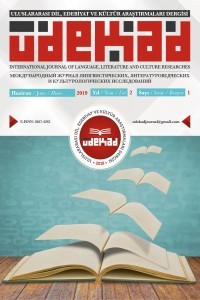
Uluslararası Dil Edebiyat ve Kültür Araştırmaları Dergisi
Yazarlar: ["Renata AKTAŞ"]
Konular:-
DOI:10.37999/udekad.1241873
Anahtar Kelimeler:Rus dili,Öznesiz cümle,Söz dizimi
Özet: The syntax course occupies a special place in the process of teaching Russian as a foreign language. Based on grammar and morphology courses, the formation of syntactic constructions is a specific, long, and time-consuming process for foreign students. That is why the syntactic analysis of phrases and sentences in Turkish universities is provided at an advanced stage of learning. This article discusses one of the types of a one–part sentence - an impersonal sentence. The analysis shows that the absence of an active figure in a sentence or a sentence without a subject, as well as the absence of a similar form in the Turkish language, cause difficulties for Turkish-speaking students in perceiving and being able to form impersonal sentences. It is important to convey to students studying Russian as a foreign language the peculiarities of the use of impersonal sentences, based on grammatical and semantic classifications. In addition, examples of recommended exercises aimed at overcoming common difficulties, preventing misunderstandings, and developing the skill of using them in the Russian speech of Turkish-speaking students are given.